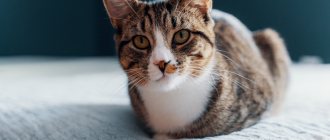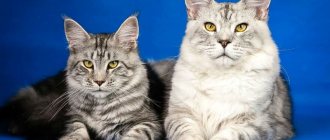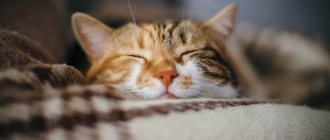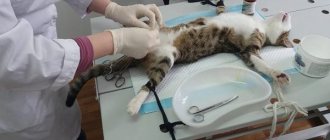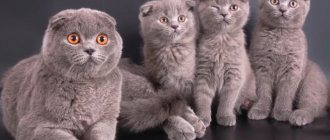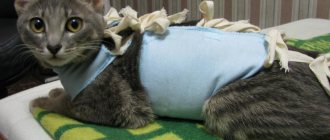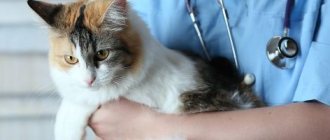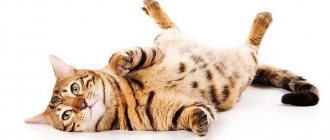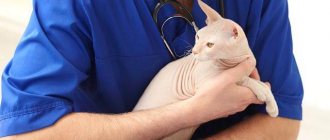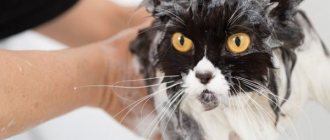Castration is an operation in which the gonads are removed from cats. Although it is not a mandatory procedure, breeders and veterinarians recommend it for all kittens that will not take part in breeding work.
For those who are planning to get a Maine Coon, it is important to know at what age it is better to have a kitten castrated and for which animals it is contraindicated.
Maine Coon diseases: Vaccinations, castration, childbirth
Cats are very smart and they rarely overeat.
Often, non-castrated animals can suffer from gluttony due to lack of human attention and metabolic disorders. Also an important role is played by nutrition and the diet that is fed to the cat (but more on that in the topic about nutrition). The degree of obesity directly depends on the age, active lifestyle and nutrition of our pets. Every owner of a sterilized animal should know that the diet of their kittens after a year should not be too high in calories and they should lead a fairly active lifestyle, then they will not have any problems with obesity. — Another interesting point associated with early castration is that sex hormones affect the growth of the skeleton of cats and cats, and surgery performed at an early age prolongs the growth time of bone plates. Thus, the growth of long bones increases and, as a result, the animals grow a little larger. This fact has already been scientifically proven and it has been revealed that such animals live longer and have better health than their counterparts castrated after puberty.
— One of the most important reasons why owners refuse early castration is supposedly a disease of the genitourinary system that occurs after surgery. It has been repeatedly scientifically proven that the occurrence of urolithiasis (urolithiasis) is directly related to poor nutrition and genetic inheritance. Also, the conditions in which the cat is kept play an important role in this, because... If you frequently lie on a cold floor and have a cold in the bladder, there is a risk of cystitis, which can also cause the occurrence of urinary tract infections.
- Many are afraid that their kitten will not tolerate anesthesia... For a physically healthy animal, with the right dose and a good veterinarian, anesthesia does not pose any danger to kittens. On the contrary, small kittens tolerate anesthesia much easier and recover from this condition faster than older animals.
— The undoubted advantage of early castration is the elimination of the development of ovarian tumors, pyometra and mammary gland cancer, and cats never suffer from empty heats, cats are not at risk of testicular cancer and prostate problems.
The main thing is to follow some rules before the operation:
The kitten must be vaccinated and must undergo worm prevention before vaccination,
Do not feed the kitten before surgery for at least 4 hours.
After the operation, do not expose the baby to drafts and keep him in a warm room (if possible, place him on a heated surface),
Until the kitten has completely recovered from the anesthesia, do not allow it to move freely around the room in order to avoid fractures of the limbs and spine when trying to jump somewhere. It is advisable to close it in a carrier or basket.
So, we see that early castration has a number of advantages, in addition to which, your male cat will always be in excellent shape, will not get sick or suffer from heat, and will live a long, carefree and happy life next to you, delighting you with its gorgeous appearance and excellent behavior.
We are pleased that recently more and more people prefer to take an already castrated (sterilized) animal from the nursery, thereby avoiding all sorts of dangers and worries associated with the operation. And this decision is reasonable, the breeder has more experience and always has proven and reliable veterinarians who will minimize all risks. We have experience on this issue and many of our graduates who have had this operation at an early age have already grown up and delight their owners with excellent health and size.
We really hope that this article will help you make the right choice.
We wish you and your pets health!
Any operation is a burden on the animal’s body, so it is important to properly prepare the animal for it by undergoing a comprehensive health examination
Optimal timing
The optimal age for castration or sterilization is considered to be 9 - 12 months, although this operation can also be performed earlier - at the age of 5 - 7 months, that is, after the animal reaches puberty. At this age, the animal’s body is fully formed, making it easier for the cat to endure surgery and the rehabilitation period.
Intervention in early adulthood
Basically, it is carried out by nursery owners who do not want pet-class kittens to fall into the hands of people who will receive low-quality offspring from them or even mixed breeds and sell them under the guise of real Maine Coons. This operation is carried out at the age of 2 - 4 months, so that such a pet is already neutered when it arrives at its new home.
The only exception when early castration cannot be recommended is if the kitten has cryptorchidism. Because it requires abdominal surgery. Because of this, the rehabilitation process is more difficult and may take longer. It is much wiser to wait until the usual time for such an operation, since this deficiency in many kittens goes away with age.
In adulthood
After a cat reaches the age of seven, castration is recommended only for medical reasons, since surgery using general anesthesia is much more difficult to tolerate in adulthood than in earlier years. This does not mean that you need to completely abandon castration. But if the decision has already been made to perform this operation on a cat, then it is necessary to conduct the most thorough veterinary examination of the pet as possible.
Maine Coon care
When a Maine Coon kitten appears in the house, you need to prepare a place for it and take care of the following:
- Buy a cat bed in advance. But you should immediately take into account that the matured cat will become quite long. In this case, a spacious bed, measuring 90 by 60, will suit him. Also, the owner can try to build a pet bed on his own, using padding polyester, cotton wool, foam rubber and fabric.
- It is better to buy a spacious tray for your Maine Coon. But a tray with high sides is not suitable for a kitten. And at the first stage, you can buy a small container.
- The choice of litter should be checked with the cat seller. The cat will only walk on the sand or granules that it was taught to walk on with its mother.
- You should definitely buy a scratching post without delay. For representatives of this large breed, it is worth taking a high scratching post.
- Toys are chosen only that are safe for the cat: soft balls and mice, without additional parts (buttons, feathers, beads, etc.). Otherwise, the cat may choke on a small part.
- Maine Coons buy spacious bowls made of glass, steel or ceramics. Such dishes are the safest for hygienic reasons.
Maine Coons definitely need to breathe fresh air. Therefore, walk cats more often in open areas if you live in a cottage or dacha with a fenced area. Or at least open a window for him, previously covered with a mesh. This way the cat can sit on the window sill of a room or balcony and receive the necessary oxygen.
Also, for residents of city apartments, you can buy special harnesses and leashes and find a safe area for walking your Maine Coon
But it is important to remember that visiting the street is only possible for this cat if it has received all the necessary vaccinations in advance.
Many breeders are concerned about the question of how to care for the luxurious coat of a Maine Coon. But in fact, it is easier to care for it than the fur of the same Persian. For Americans, 2-3 brushings per week are enough. And during molting, the procedure is done every day. Pets are bathed with special shampoos for long-haired cats. Also, Maine Coon wool has a unique ability to self-clean. Therefore, water procedures can be arranged 4-5 times a year.
Like many other cats, these representatives need care for their eyes, ears and teeth. Basically, all parts of the body are wiped with cotton swabs dipped in boiled water.
Periodically, the Maine Coon is examined by a veterinarian. You should ask him about important medications for your pet that should be in your medicine cabinet at home. This way you can prevent and extinguish the disease at the root.
Why neuter your Maine Coon?
When selling a Maine Coon, a mandatory condition for purchasing a kitten is that the breeder can specify the castration of the pet in the future or sell an already neutered cat “for a pillow”
Why is this so important? You've probably heard the phrase kittens "On the pillow" before.
Quite a funny name for castrati, but it does not at all indicate that over time the cat will become boring and clumsy and turn into a couch potato. No! It’s just that this animal is sold for love, to stroke it on your lap, to put it side by side on a pillow to sleep, in general to love, feed and respect. And not in order to make a profit from his breed!
You've probably heard the phrase "On the pillow" kittens before. Quite a funny name for castrati, but it does not at all indicate that over time the cat will become boring and clumsy and turn into a couch potato. No! It’s just that this animal is sold for love, to stroke it on your lap, to put it side by side on a pillow to sleep, in general to love, feed and respect. And not in order to make a profit from his breed!
Castration (or sterilization) is a special surgical operation as a result of which the gonads are removed from animals. The result is a lack of procreation instincts.
After castration, cats no longer have the desire to mark their territory and arrange serenades in the middle of the night, and they also become less aggressive in their behavior, your child will no longer fight with neighbor cats for the lady of his heart, which means no wounds or injuries. Cats no longer require a cat after surgery. No more monthly heats - they no longer roll on the floor, trample and scream wildly.
Most owners note that after castration, cats become more obedient, spend more time with them and again begin to get involved in games, as in their youth. The fact that cats get fat and sleep most of the time is the fault of careless owners, because all these are symptoms of obesity. Neutered pets eat less, which in turn is a plus - it’s more economical. But for some reason people are not able to understand that the measure must be designated specifically to the person. Poor cats are unable to move away from the cup in time. Absolutely
Source
Castration of cats and Maine Coon cats
So, you acquired a cat or female of the Maine Coon breed (Maine Coon), a beautiful, shaggy, big cat or female cat, from titled parents as a pet, not for breeding. The concept “not for breeding” means the fact that when buying a cat for yourself, you will have to castrate the cat and not use it as a breeder, the same applies to cats - the cat is subject to MANDATORY sterilization, which means that their breeding is completely excluded.
Castration of a Maine Coon cat is the removal of the testes from males. The procedure for castrating a cat is best carried out at the age of 7-8 months. The castration operation is considered the most elementary of operations in veterinary practice. Many doctors do not consider castration of cats to be an operation at all, performing it several times during a work shift. Surgery to castrate a cat almost never causes complications. If the cat is young and healthy, castration will not bring any unpleasant surprises.
Castration of a Maine Coon cat is the complete removal of all reproductive organs of the cat (both ovaries and uterus). Technically, both sterilization and castration of a cat are generally simple operations.
But the word castration or sterilization causes panic fear in you, and very often I hear from buyers the phrases: “I feel sorry for depriving a cat of its advantages”, “I feel sorry for the cat, she will never become a mother”, “castrating a cat is cruel!”, “ sterilization - yes, this is a real operation, mockery of a cat,” and stuff like that.
Often, many owners don’t even think about how many problems an unsterilized animal, a Maine Coon cat, can cause in the future!
Makecoon cats reach sexual maturity at 6-7 months.
Source
Why castrate
In Europe and America, castration is perceived as a natural and necessary process. In Russia there are many opponents of the procedure, who believe that it is unnatural and brings pain to the pet. At the same time, people forget that the cat is domesticated and its reproductive cycles have gone astray. And if the owner cannot ensure the satisfaction of instincts, then he dooms the pet to constant stress.
Breeders agree that not castrating a cat means abusing him. This affects the animal’s psyche, causes urological diseases, and makes life shorter.
Benefits of castration for Maine Coons:
- Lifespan increases by almost 1.5 times due to the absence of stress due to hormones.
- The risk of developing urolithiasis (urolithiasis) in cats is reduced by 30%. Neutered cats suffer less from fibroids, cysts, and cancer.
- With properly organized nutrition (neuters need 30% less calories), their size increases due to muscle building, not fat deposits. And most owners want to raise a giant Maine Coon.
- The character of a castrated animal is more friendly. Even Maine cats, distinguished by their independence, become affectionate, human-oriented, and try to spend more time with him.
Diet of a neutered pet
There is a myth that castration leads to the development of urolithiasis. This is not entirely true. The appearance of stones and sand in the kidneys is caused by poor nutrition, the predominance of phosphorus- and magnesium-containing foods in the diet, as well as lack of physical activity and insufficient drinking regimen.
Urolithiasis can also occur in an uncastrated cat. It has been noticed that operated animals love to eat more and suffer from obesity. And this is precisely what increases the risk of developing urolithiasis in castrates. The disease can be provoked by castration at an early age (up to 6-7 months), due to which the lumen of the urethra narrows and deposit crystals cannot come out with urine.
In order to prevent ICD and keep your pet healthy, you should:
- Do not overfeed, giving in to the immediate desire to please your pet.
- Feed in portions with special food for castrated animals. They contain substances that can reduce the acidity of urine.
- In a normal diet, exclude fish, as well as foods high in phosphorus, magnesium and calcium.
- Give preference to wet food.
- Maintain drinking regime.
- Give vitamins regularly.
- Be examined in a clinic to prevent urolithiasis.
Can I be spayed during heat?
Can a cat be spayed while in heat? This question is perhaps the most discussed on the Internet. It is raised with enviable consistency by both doctors and animal owners. Moreover, there is no consensus in any camp. Half say it’s possible. Half is impossible.
What to do? The cat screams constantly, or every 3 weeks. Or she “flowed” in such a way that the white light was not pleasant either to herself or to the people next to her. The answer is clear: if your cat does not have breeding value and you do not want offspring from her, feel free to sterilize her. We, our team, have been laparoscopically sterilizing cats in completely different conditions for many years, and have not observed a single case of complications.
A couple of years ago we asked this question at an international veterinary forum: “Is it possible to sterilize cats during heat? And why?". About 200 specialists from all over the world responded to us.
The comments of Western experts agreed on approximately one thing - it is possible to sterilize, regardless of the presence of estrus, but the operation itself should be carried out on a clinically healthy animal, within the recommended age range, and would not have any abnormalities in the anamnesis (allergies to medications, etc.)
The comments of Russian veterinarians were somewhat varied and were distributed approximately as follows: half argued that it is possible to sterilize, period. Those who were against sterilization during estrus argued their positions as follows: the majority pointed to the increased risk of bleeding during surgery on the “current” uterus. A number of doctors are at risk of hormonal imbalance. There were also some rather unusual answers. For example:". during estrus, the ovaries are functionally active and when they are removed, there is a risk of dropping a piece of this organ into the abdominal cavity, where it will take root and begin to act like a real ovary. "
Source
Sterilization options
For cats, there is only one simple manipulation - an incision is made on the scrotum through which the ovaries are removed. Therefore, the appearance of a cat allows you to determine whether he is neutered or not.
The physiological characteristics of females complicate the process, because it is necessary to remove all internal genital organs - the uterus and ovaries.
- The traditional method involves making an incision in the abdominal cavity and removing organs through it.
- Endoscopic sterilization - through small punctures. The advantages are obvious - without contact of internal organs with the environment, the risk of infection is lower, the absence of stitches facilitates recovery in the postoperative period.
- More complex cavitary interventions require increased attention from the veterinarian during and after surgery.
- For cats, sterilization is also possible when the fallopian tubes are ligated. At the same time, they are deprived of the opportunity to produce offspring, but jumps in hormonal levels are present, as well as characteristic behavior during a jump in sex hormones.
Important Features
Unfortunately, there are many prejudices generated by ignorance around the castration (sterilization) of animals. Pet owners often wonder: is castration of a Maine Coon really necessary? Will an animal that has lost the ability to reproduce become inferior? Is the operation associated with unbearable pain?
Opponents of castration insist that this procedure is unnatural, forgetting that in the wild the reproductive cycle of animals depends on the length of daylight hours. A wild animal usually produces offspring once a year, during the most favorable period for this, and the rest of the time the female’s body recovers and prepares for the next reproductive cycle.
Useful to read: What vitamins do Maine Coons need?
After the cat became domesticated, the natural rhythms of life, tied to daylight hours, were disrupted, and the amount of food became constant regardless of the season. The animal has gained the opportunity to reproduce several times a year, which has an adverse effect on the body condition of a cat that gives birth frequently and a lot.
If a pet cannot satisfy the instinct of procreation, its life becomes endless stress. The animal begins to scream and mark its territory, which causes inconvenience to the owners, but first of all, the cats themselves suffer. The character of a “full-fledged” cat, deprived of the opportunity to mate with a cat, deteriorates - he becomes nervous, unsociable, and sometimes aggressive.
A cat, overwhelmed by the reproductive instinct, can run away, fall out of a window, get lost, or get hit by a car. If the fugitive does return home safely, he may bring not only parasites, but also infections from the street. Attempts to “calm” a pet with hormonal drugs such as “CounterSex” often lead to serious diseases, including cancer.
Why is it necessary?
It is recommended to castrate a Maine Coon cat for the following reasons:
- Unpleasant odor due to cat marking territory.
- Fights with rivals, during which the cat can be seriously injured.
- Severe stress due to the fact that there is no way to satisfy the reproductive instinct.
- After castration, life expectancy increases approximately 1.5 times.
- The cat stops focusing on the reproductive instinct and begins to develop other interests.
Maine Coon cats are sterilized mainly in order to get rid of periodic estrus, as well as to minimize the risk of the animal developing diseases of the reproductive system.
How is the operation performed?
Castration is carried out by a qualified veterinarian in a trained and well-equipped operating room. It is undesirable to operate at home, since the risk of wound infection increases in conditions of insufficient sterility of the room.
At the first stage, the veterinarian shaves (plucks) the hair on the scrotum, and then treats the surgical field with antiseptics. There are two ways to operate: closed and open.
In the first case, the doctor acts according to the following scheme:
- Cutting the skin with a scalpel;
- Extraction of the testis and appendage from the surgical wound;
- Ligation of the cord, covered with the common vaginal membrane, with two ligatures of thin catgut;
- Cutting off the testis along with part of the spermatic cord 1 cm above the lower ligature;
- Checking the reliability of ligatures;
- Resection of the second testis through a second incision in the scrotum;
- Introduction of antiseptic ointment.
Open operation:
- Dissection of the scrotal tissue with a scalpel simultaneously with the vaginal membrane;
- Extraction of the testis and appendage from the surgical wound;
- Separation of the spermatic cord and sperm duct;
- Formation of a biological node (parts of the testis are connected to each other several times (4-6);
- Excision of the second testis;
- Antiseptic treatment.
No stitches are applied, the wound heals by secondary intention. In most cases, the animal’s rehabilitation lasts 1-2 days, and complications arise in rare cases.
Age at first mating
Maine Coons reach sexual maturity at 7–8 months. During this period, cats have their first heat, and the cats begin to mark their territory. From this moment on, the animals are ready to mate and are able to bear offspring. However, there is no need to rush into starting breeding work: you need to allow the Maine Coon’s body to mature and get stronger.
At one and a half years old, the Maine Coon cat is ready for breeding work and is at its hormonal peak. It is during this favorable period that the first mating should be carried out: this way the owner will receive a strong and experienced sire.
By the age of one and a half years, Maine Coon females reach full maturity, by which time they are in their third heat. The cat’s body is stronger and ready for pregnancy. At this age, the peak of sexual heat occurs, and the first mating should take place without complications.
Main indications
Castration of a Maine Coon cat involves removal of the testes (testicles). Due to changes in the hormonal background, the animal's libido decreases, it begins to behave more calmly, stops meowing to attract cats and marking territory.
It is sex hormones that make a cat seek cat company; this is normal behavior that pets need to procreate.
In country houses, where they can calmly solve problems with the reproduction of offspring, there is, as a rule, no need for surgery.
But residents of apartment buildings may be annoyed by an animal that is constantly meowing.
Actually, that’s why the only solution for them is to go to a veterinary clinic, but before that you should find out when is the best time to castrate a Maine Coon cat.
The absolute indications for the operation are as follows:
- the presence of animals of different genders in the same area;
- problems associated with the ovaries in boys and purulent inflammation of the uterus in girls;
- any disturbances in the pet’s behavior are observed;
- the presence of an unpleasant odor in the housing due to regular marking of the territory.
The animal stops showing aggression, he is no longer interested in cats, he is completely calm towards them. After the operation, the cat develops new interests, as hormonal attacks stop.
In some European countries, castration is considered a mandatory procedure for Maine Coons/Yandex Collections
The operation is treated quite normally, and every breeder unquestioningly fulfills these requirements.
There are a number of contraindications when castrating a Maine Coon cat is not recommended, these include:
- there are chronic inflammatory processes;
- heart, liver, and kidney diseases have been diagnosed;
- there are no necessary vaccinations, which is why there is a high probability of infection, as well as deterioration in health during the rehabilitation period;
- during estrus in cats, during this period severe bleeding may occur due to the congestion of the uterus;
- allergic reactions to anesthetic drugs.
Also one of the contraindications is old age, when pets are over seven years old.
Old animals tolerate post-operative recovery much worse, and this period lasts much longer than in young and full-strength kittens.
Best age
When is the best time to neuter a coon? The operation depends on the age of the pet. Maine cats are fully ready to reproduce after reaching the age of 7-9 months. Castration at this age is the best solution, as it prevents the animal from developing “adult” habits of marking territory and yelling in anticipation of meetings with the opposite sex.
Castration of mature cats
Often castration is performed at a later age for various reasons. Before the operation, it is necessary to conduct a preliminary examination of the animal. For a healthy animal, surgery occurs without complications, since the main risks are associated with the use of anesthesia.
Early castration
At what age to sterilize a cat, the owner decides independently. One of the available options is removal of the gonads at the age of 8-16 months. Advantages of early surgery:
- carried out without anesthesia;
- rapid recovery of kittens compared to adults;
- The breeder carries out such an operation before handing the baby over to the owner, so it is easier to bear mentally.
A little theory
During castration of a Maine Coon, the animal's gonads are surgically removed. In cats these are the testes, and in cats these are the ovaries. Thus, the Maine Coon loses the opportunity to continue his race, and, in addition, his sex drive disappears. Castration is often used to correct a pet’s behavior. After all, after this operation, cats become calmer and less aggressive during estrus. Cats do not mark territory and do not fight with rivals.
Some owners of Maine Coon girls prefer to undergo tubal ligation rather than spaying, believing that this operation is more harmless to the pet. In fact, with tubal ligation, the cat only loses the ability to become pregnant and bear offspring, but the instincts calling her to reproduce remain.
Castration is not always carried out at the request of the Maine Coon owner. For some diseases, it is necessary to resort to castration for medical reasons.
Choosing a Maine Coon kitten
This article will not discuss the question: “How to choose a HEALTHY Maine Coon kitten?” A lot has already been written about this. Let's try to answer the following questions: “How to choose a Maine Coon kitten?” and “Why do people choose Maine Coons?”
What can be attractive about a Maine Coon? Firstly, it's its size. Cats of this breed are not much larger than cats of other breeds, but male cats are much superior to their counterparts in this indicator. At the same time, they are very sweet, kind and affectionate like dogs. Thanks to such a handsome man, friendship and communication with him gives his owner the opportunity to imagine himself for a second as a trainer of tigers or wild lions. Besides, I also want to brag about Kunischey to my neighbors and friends. Just imagine, guests come to you, sit, talk, sip glasses of wine (cognac, beer, tea...), and then HE appears: big, woolly, with a long luxurious tail, with lynx tufts on his ears and tufts of hair on his huge paws, and, in full view of everyone, freezes in the pose of a sphinx, proudly stretched out on the floor. Naturally, at first everyone freezes (drinks spill from glasses and cups), then they gasp and groan for a long time and congratulate the owners. But these are moments of triumph for the owner! For such minutes, you don’t feel sorry for the time and money spent on growing such a “beast”!
In addition to the size, you will probably be attracted to the Maine Coon by the combination of its menacing, wild, unapproachable appearance with an affectionate and kind character. Undoubtedly, you will observe with great interest all the behavioral features of such a pet: before drinking, he (she) rake the water with his paw, or how he eats food from his paw.
His voice does not at all match the appearance of this giant. You will be amazed to hear such a big cat say “meow” in a tiny voice.
A very attractive fact is that Maine Coons are a native breed.
Source
What are the options?
Often, compassionate owners strive to preserve their pet’s opportunity to experience the joys of sex and motherhood and reject castration. Such sentimental measures make everyone suffer, because there is not much to solve the issue of creating humane conditions for an animal suffering from hormonal desire:
- You can try organizing a date with your furry friend. After this, it will be necessary to take care of providing a place of residence for new coons or just outbred kittens.
- Use special veterinary medications. These can be herbal tinctures or hormonal contraceptives. Herbal remedies become addictive very quickly, and the use of chemicals is stressful for cats and can lead to a decrease in the animal’s immunity.
Important! The use of feline contraceptives disrupts the endocrine system and provokes cancer.
Castration allows you to maintain the health of the pet and the nerves of the owner. The operation, performed under general anesthesia, does not bring suffering to the animal, and the cessation of hormonal attacks has a beneficial effect on the animal’s body.
Many owners who initially resisted the idea of castration and then decided to do it as a last resort under the influence of the animal’s screams note how much the Maine Coon’s character has improved.
Features of the estrus period in Maine Coon cats
Every person who brings a cute little kitten into their home must remember that in a few months it will be filled with screams and howls. Heat (estrus) is a natural part of the life of any cat, so owners should be prepared for it, first of all, have all the necessary information.
Maine Coons are a slow-maturing breed; they reach full maturity only at 3-4 years of age. But this does not mean that the first estrus in females will begin at the same age. Everything is quite individual, but most often this happens at 6-10 months.
Many owners who are not too knowledgeable about the characteristics of the breed are afraid to breed a cat until 2-3 years old, but this idea is fundamentally wrong. There is a myth that early mating can stunt the animal's growth. He is also unfaithful.
The ideal time for the first mating of a Maine Coon is 10-15 months. At this age, the cat is already fully formed and ready to bear offspring. If you untie it later, there is a possibility of hormonal imbalance, and after this, the appearance of problems with behavior and health. Empty heats that do not end in pregnancy are undesirable.
Cat owners must immediately decide for themselves whether they will breed the cat or not. The first can only be afforded by owners of club animals with a pedigree and an excellent gene pool, because only in this case is there any hope of providing a good home for all the kittens. Everyone else is strongly recommended to sterilize their cat. It is advisable to do this at a fairly early age, even before the first heat.
Some people consider sterilizing cats inhumane, preferring to feed them hormonal or sedative drugs, but this is completely unacceptable. An imbalance can lead to severe hormonal diseases, which are the cause of cancerous tumors, cysts, and also pyomas - gn
Source
Features of the estrus period in Maine Coon cats
Every person who brings a cute little kitten into their home must remember that in a few months it will be filled with screams and howls. Heat (estrus) is a natural part of the life of any cat, so owners should be prepared for it, first of all, have all the necessary information.
Maine Coons are a slow-maturing breed; they reach full maturity only at 3-4 years of age. But this does not mean that the first estrus in females will begin at the same age. Everything is quite individual, but most often this happens at 6-10 months.
Many owners who are not too knowledgeable about the characteristics of the breed are afraid to breed a cat until 2-3 years old, but this idea is fundamentally wrong. There is a myth that early mating can stunt the animal's growth. He is also unfaithful.
The ideal time for the first mating of a Maine Coon is 10-15 months. At this age, the cat is already fully formed and ready to bear offspring. If you untie it later, there is a possibility of hormonal imbalance, and after this, the appearance of problems with behavior and health. Empty heats that do not end in pregnancy are undesirable.
Cat owners must immediately decide for themselves whether they will breed the cat or not. The first can only be afforded by owners of club animals with a pedigree and an excellent gene pool, because only in this case is there any hope of providing a good home for all the kittens. Everyone else is strongly recommended to sterilize their cat. It is advisable to do this at a fairly early age, even before the first heat.
Some people consider sterilizing cats inhumane, preferring to feed them hormonal or sedative drugs, but this is completely unacceptable. An imbalance can lead to severe hormonal diseases, which are the cause of cancerous tumors, cysts, and also pyomas - gn
Source
A cat breed whose name resembles some kind of magic spell - the Maine Coon - originates from cats living on the farmland of Maine, located in the northeastern part of the United States.
The literal translation of Maine Coon is Maine (Manx) raccoon. Ask why this name? For the reason that the Maine Coon is similar in color and size to these cute animals. There is information, probably taken from legends, that individual Maine Coons can reach a mass of 15 kilograms. One way or another, today they are the largest domestic cat breed.
New England had harsh winters, so only large, long-haired breeds survived. The very first Maine Coon was named Captain Jenks of the Marine Cavalry.
It was shown at exhibitions in Boston and New York in the 19th century, where it attracted the attention of the public, but at the turn of the century they were relegated to secondary roles by furry Persians. And the Maine Coon breed managed to survive only due to the fact that farmers gave preference to them over smart, but completely useless Persian cats, who did not know how to hunt like the Maine Coon, and were clearly inferior in size to them
The calling card of Maine Coons is their large, muscular body, which has a rectangular shape and a wide chest. The large head sits firmly on a powerful neck of medium length and has sharp features.
Thanks to their large ears, set very wide, and the characteristic tufts at their tips, Maine Coons are very reminiscent of lynxes. These cats have incredibly beautiful eyes - golden, green or amber and slightly slanted.
Maine Coon paws are very strong, not long and end in round pads. There are tufts of hair between the fingers. Their tail is very long, reaches m
Source
What is castration?
Castration of cats allows you to completely eliminate the appearance of offspring in your pet and reduce hormonal surges that affect his behavior. After the operation, the Maine Coon cat becomes calmer, does not yell during the mating season and damages the furniture less. Neutered animals are more attached to humans and have a sociable character.
Animals of both sexes are subject to castration. During the operation, hormone-producing organs are removed. For cats, the operation is simpler: the testicles are removed through a small incision in the scrotum. Based on the appearance of a castrated cat, it is difficult for a non-specialist to determine whether the animal is castrated: in a furry animal, the testicles are determined only by palpating the genitals.
Important! Castration can be carried out both after reaching puberty and at an early age of 8-16 weeks. The second option is common among Western breeders
For a cat, the operation is more complicated, since internal organs - the ovaries and uterus - are removed. The operation can be performed traditionally, with an incision in the abdominal cavity, or endoscopically, through small punctures. The second option is more preferable. Advantages of endoscopic castration of cats:
- there is no direct contact between internal organs and the environment;
- painless incision;
- there is no need for a special postoperative period;
- no seams.
Castration of cats and female cats is carried out under anesthesia. For cats, the operation is more complex, so you should be more careful when choosing a veterinarian. Sometimes sterilization is offered for cats, which involves ligating the fallopian tubes. However, it is worth considering that although sterilized cats cannot have offspring, they still experience hormonal fluctuations.
Preparation
Before castration, it is necessary to conduct a full examination to identify pathologies of the cardiovascular system and internal organs.
This is necessary in order to minimize the risk that the pet will not tolerate anesthesia.
The necessary studies include ultrasound and ECG of the heart, and it is also advisable for the Maine Coon to be examined by a cardiologist.
Before castration, an adult animal cannot be fed for 12 hours, and watered for 4 hours. For kittens up to 4 months, the fasting time is reduced to 4 hours.
Contraindications to castration
In most cases, veterinarians are “FOR” castration, unless the animal is a representative of a rare breed and is not intended for mating. Surgery is not recommended in several cases:
- Having heart, kidney or liver disease.
- Old (over 7 years) or early (up to 6 months) age.
- Allergy to anesthesia medications.
Contraindications are not absolute, so an experienced veterinarian will be able to find a solution to the problem. For example, there are methods of medical castration (insertion of an implant) that will allow you to restore the animal’s ability to reproduce if necessary.
Whether to castrate a Maine Coon or not is the choice of the animal owner. If you are ready to put up with night concerts and organize cat romantic meetings on your territory, then surgery is not necessary. But what to do with the pungent smell of tags, which literally permeates the entire apartment? Or the wild howls of your beloved cat, preventing you from resting peacefully on your legal day off? In an apartment it is difficult to put up with such discomfort. And it is in such cases that veterinarians advise castrating the animal.
New life for a cat
After the operation, when all the stitches on the soul and body of the coon have healed, a new stage in the pet’s life together with its owner begins. If the animal was castrated as an adult, sexual behavior may still be observed for some time. Its cause is now habit, not sex hormones.
Timely surgery greatly simplifies the life of your furry companion, allowing him to live peacefully without unnecessary suffering from unfulfilled physiological needs.
The tendency of neutered cats to become extremely obese has been greatly exaggerated. If the owner pays attention to the pet’s nutrition and creates conditions for the coon’s physical activity, excess fat does not accumulate.
When choosing food and portion sizes, you must take into account that your pet's metabolic rate has slowed down somewhat, and he needs to reduce his caloric intake by a third. It is acceptable to use special food for feeding cats.

